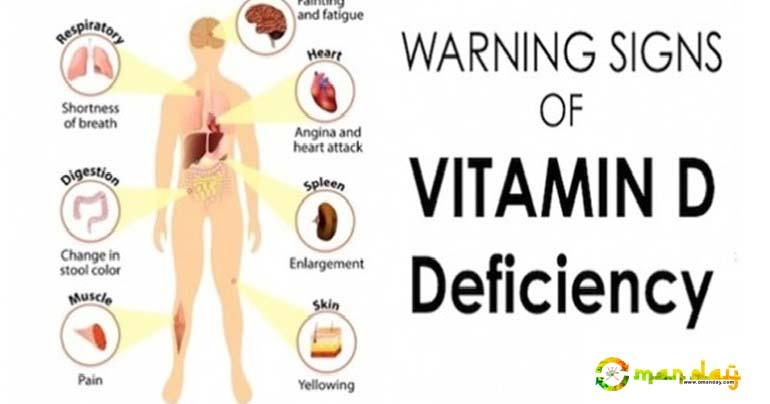Science Confirms That Vitamin D Provides Many Benefits To Your Physical And Mental Health
Vitamin D is known as the “sunshine vitamin” since it is produced in the skin in response to sunlight. There is no doubt that this vitamin is more than just a vitamin. It actually functions as a steroid hormone in your body
So, if you get a little sun during the summer, or you preferred to use sunscreen, then you should definitely think about vitamin D supplementation.
Vitamin D deficiency can have negative effects on your health and can lead to the development of many diseases!
Symptoms of Vitamin D Deficiency
A weak immune system that is not able to fight infections. This often results in colds ,seasonal bugs and other chronic infections
You feel constantly tired despite sufficient sleep
People with low vitamin D levels may sweat more compared to people with normal vitamin D levels. They can experience excessive sweating especially on the neck and forehead
Vitamin D is extremely important for the health of bones, so the deficiency of this vitamin can lead to weak bones, back pain, bone pain, or joints pain
Low levels of vitamin D can increase the risk of bone fractures and tests can show very low bone mineral density
It is scientifically shown that vitamin D deficiency is related to depression
High body inflammation that can block the healing efforts of your body
Excessive hair loss from the entire body
Unexplained muscle pain and soreness
Vitamin D deficiency can cause higher concentration of calcium build-up in the arteries, increasing the risk of stroke, hypertension, obesity, type 2 diabetes, and heart diseases
Low vitamin D levels disrupt the production of melatonin and affect the consistency of sleep, causing sleep apnea, frequent waking, insomnia, or restless leg syndrome.
Why you need to optimize your vitamin D levels
It’s Hard To Get Enough From The Diet
When the sun rays get to your skin, vitamin D3 is produced from cholesterol. Talking historically, this was the main source of Vitamin D for humans. Today, since we use sunscreen and tend to avoid the sun, most of us can experience a deficiency.
There are 2 main forms of dietary Vitamin D:
Vitamin D2 – Ergocalciferol – the plant form.
Vitamin D3 – Cholecalciferol – the animal form.
Vitamin D3 (the animal form) can increase blood levels more effectively than vitamin D2. The worst part is that there is only one good source of D3 in the diet. 1 tablespoon of cod fish liver oil supplied 1350 IU, about double the RDA. Fortified milk and fatty fish are other half-decent sources that contain vitamin D. However, you will need to eat a lot of these foods in order to obtain the recommended intake. So, the healthiest and best option is to get the vitamin D through some more sun. However, you should make sure not to burn!
May Reduce Risk Of Death
According to some studies, supplementing with vitamin D can reduce total mortality by 6-7%. In other words, if you are getting sufficient vitamin D, you have a reduced risk to die over a certain period of time.
May Reduce Cancer Of All Causes
There is a fair amount of evidence suggesting that a vitamin D deficiency is related to an increased risk of different kinds of cancer. A study involved healthy post-menopausal women supplementing with 1,100 IU of Vitamin D3 (along with calcium). The results showed that the women had reduced risk of developing cancer of all causes by 60%.
Cardiovascular Disease
Cardiovascular disease is the leading cause of death worldwide. According to some epidemiological studies, the low levels of vitamin D can cause increased risk of heart attacks!
Reduces Incidence Of Type I Diabetes In Children
Type I diabetes is an autoimmune disorder. It is usually caused when the immune system attacks the insulin-generating beta cells of the pancreas. A study included a group of 10,921 infants supplemented with 2,000 IU per day of Vitamin D, followed since the day of birth. The results found out that they had a 78% reduced risk of developing type I diabetes.
Reduces Falls And Fractures In The Elderly
The fact that the elderly don’t get as much sun, leads to the conclusion that they are at particularly high risk of vitamin D deficiency. A study that involved elderly individuals showed that supplementing with vitamin D has lowered risk of both fractures and falls. The required dose is 800 IU.
May Be Protective Against Flu And Asthma Attacks
A study that included school children found out that supplementing with vitamin D reduced risk of Influenza A infection by 42%. Moreover, it managed to reduce the occurrence of asthma attacks. Low levels of vitamin D are related to increased respiratory infections, which means that vitamin D has a significant role in the immune defense.
...[ Continue to next page ]
Share This Post






